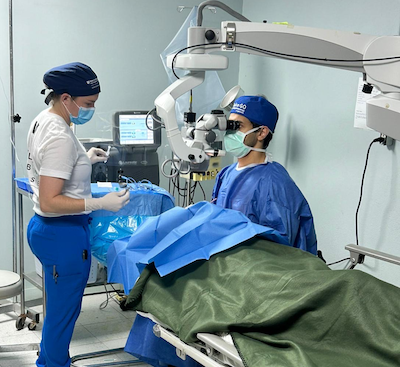Curriculum

The Global Ophthalmology fellowship is registered with the Association of University Professors of Ophthalmology (AUPO) and will follow the AUPO cornea fellowship compliance program and meets guidelines set forth by the AUPO fellowship compliance committee. There are additional requirements of Duke Global Ophthalmology the fellow will be required to meet. The fellow will learn eye banking, essential in the treatment of corneal disorders, and the variations of treatment needed to perform in an international setting, including low-income nations.
The primary numerical requirements of a cornea fellowship are as follows:
- See approximately 2,000 patients for corneal, refractive, and lens-related conditions. (Dr. Williams’ clinic sees an average of 150 per week, or about 7,500 per year). On international trips, volume of patients can exceed 300 patients per day.
- 100 hours of research and didactic.
- Miracles In Sight provides roughly 100 hours of eye banking training and the Duke Cornea Fellowship provides adequate didactic training.
- Fellows will be required to work on and complete a research project internationally.
- 70 corneal transplants (minimum of 15 penetrating keratoplasty, 15 endothelial keratoplasty, and 5 DMEK). Dr. Williams’ Tuesday surgery accounts for about 2 transplants per week (100 total), about 3 IOL exchanges/secondary IOLs per week (150 total), and about 10 cataract surgeries per week (500 total). This is more than enough to meet the minimum requirements, not including the international trips, where sometimes we have done as many as 18 corneal transplants in a single day.
- Refractive surgery requires at least 50 cases observed with 8 primary cases.
Application and Requirements
Application
Duke Global Ophthalmology fellowship participates in SFMatch. Applications must be submitted by the deadlines set by SFMatch listed on the website.
For more information about the Duke Global Ophthalmology fellowship, contact the program coordinator Mary Harris at mary.e.harris@duke.edu
We do not provide immigration sponsorship for Clinical Associates.
Requirements
Full North Carolina medical licensure required.
A training license is not accepted. International medical school graduates who do not qualify for a North Carolina Medical license cannot be offered fellowship positions. Immigration sponsorship for clinical associates is not provided.
Fellows are expected to submit one or more manuscripts for peer-reviewed publication and prepare at least one application for external support.
The program will develop fellows who will help create developing ophthalmology residency programs abroad and contribute to the academic literature and research capacity of ophthalmology programs and eye banking in developing countries.
It is our hope that trainees will go on to careers that support curing global blindness and will also train others across the globe, multiplying the number of surgeons.